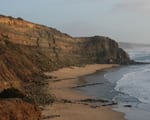A new report by SMU religious studies expert Mark A. Chancey has received widespread coverage by the media.
The report by Chancey, “Reading, Writing & Religion II,” found that most of the 60 public school districts in Texas that offer Bible study courses aren’t meeting a 2007 state law mandating that the courses be fair as well as academically and legally sound. On March 9 the Houston Chronicle published a piece by Chancey about the research study titled “Bible courses a mixed bag in school.”
Chancey prepared the report for the Austin-based education watchdog group Texas Freedom Network. His study uncovered bias, factual errors and insufficient curriculum standards in Texas public school Bible courses.
An SMU Religious Studies professor, Chancey recommends the Texas State Board of Education develop Bible course curriculum standards and the Texas Education Agency be allowed funds for a teacher training program.
“As a biblical scholar and especially as a parent, I want our state’s public schools to take the study of the Bible’s influence as seriously as they do the study of science or history,” Chancey told The Dallas Morning News. “Academically, many of these classes lack rigor and substance, and some seem less interested in cultivating religious literacy than in promoting religious beliefs. Their approach puts their school districts in legal jeopardy and their taxpayers in financial jeopardy.”
Chancey, a professor in SMU’s Dedman College of Humanities and Sciences, has devoted considerable attention to the constitutional, political and academic issues raised by religion courses in public schools.
EXCERPT:
By Mark Chancey
for the Houston Chronicle
In one recent Texas Bible course, students learned that modern racial groups trace their origins back to Noah’s three sons. In another, students considered the pros and cons of different theories regarding when Christians will be “raptured” to Heaven. Elsewhere, students spent two days watching a video exploring the possibility that biblical stories about angels actually record visits by space aliens. Yet another class utilized a resource that suggests God cut off his relationship with Jews because they rejected his son Jesus.These classes weren’t taught in Sunday school or private religious academies. These were all offered in public high schools for academic credit. I had the opportunity to review the materials for 60 courses taught in school districts and charter schools for the report “Reading, Writing & Religion II: Texas Public School Bible Courses in 2011-12,” which was recently published by Texas Freedom Network Education Fund. What I discovered was that while such courses are legally required to be religiously neutral and are supposed to be academically rigorous, all too often, the opposite is the case.
Some successes
To be sure, there were notable success stories, such as the courses taught in Conroe and Goose Creek ISDs. In courses like these, students learned about the Bible’s rich impact not only on religious life but also on literature, music, art, philosophy, politics and other spheres of culture in legally and academically appropriate ways. These courses typically recognized that different religious communities not only have different Bibles but different ways of reading the Bible. They took such variations seriously without promoting one religious viewpoint over all others – the hallmark characteristic of constitutional courses that respect the religious freedom of their students and the religious diversity of their communities.
Most courses, however, were less successful. Intentionally or not, they often presented material from a particular religious perspective.
What were some of the recurring problems?
Most courses focused solely on the Protestant Bible, as if Jewish, Roman Catholic and Eastern Orthodox Bibles did not even exist.
Follow SMUResearch.com on Twitter.
For more information, www.smuresearch.com.
SMU is a nationally ranked private university in Dallas founded 100 years ago. Today, SMU enrolls nearly 11,000 students who benefit from the academic opportunities and international reach of seven degree-granting schools. For more information see www.smu.edu.
SMU has an uplink facility located on campus for live TV, radio, or online interviews. To speak with an SMU expert or book an SMU guest in the studio, call SMU News & Communications at 214-768-7650.

 Fruit flies fed organic diets are healthier than flies fed nonorganic diets, study finds
Fruit flies fed organic diets are healthier than flies fed nonorganic diets, study finds Center for Creative Leadership to study innovative learning method of SMU Lyle School of Engineering
Center for Creative Leadership to study innovative learning method of SMU Lyle School of Engineering Parenting program tackles child abuse and neglect among formerly homeless families
Parenting program tackles child abuse and neglect among formerly homeless families Hiding in plain sight: How invisibility saved New Mexico’s Jicarilla Apache
Hiding in plain sight: How invisibility saved New Mexico’s Jicarilla Apache White dwarf supernovae are discovered in Virgo Cluster galaxy and in sky area “anonymous”
White dwarf supernovae are discovered in Virgo Cluster galaxy and in sky area “anonymous” Study: Most Texas ISDs that are teaching the Bible are skirting 2007 state law
Study: Most Texas ISDs that are teaching the Bible are skirting 2007 state law Study finds Jurassic ecosystems were similar to modern: Animals flourish among lush plants
Study finds Jurassic ecosystems were similar to modern: Animals flourish among lush plants SMU contributes fossils, expertise to new Perot Museum in ongoing scientific collaboration
SMU contributes fossils, expertise to new Perot Museum in ongoing scientific collaboration 100 million-year-old coelacanth discovered in Texas is new fish species from Cretaceous
100 million-year-old coelacanth discovered in Texas is new fish species from Cretaceous
 Academic achievement improved among students active in structured after-school programs
Academic achievement improved among students active in structured after-school programs Texas frontier scientists who uncovered state’s fossil history had role in epic Bone Wars
Texas frontier scientists who uncovered state’s fossil history had role in epic Bone Wars Observed! SMU’s LHC physicists confirm new particle; Higgs ‘God particle’ opens new frontier of exploration
Observed! SMU’s LHC physicists confirm new particle; Higgs ‘God particle’ opens new frontier of exploration DOE Award: advancing SMU’s link to the God particle
DOE Award: advancing SMU’s link to the God particle